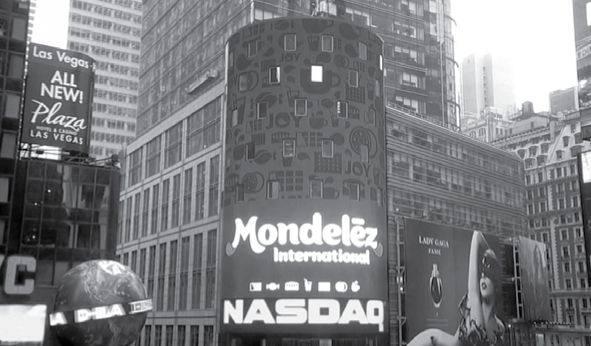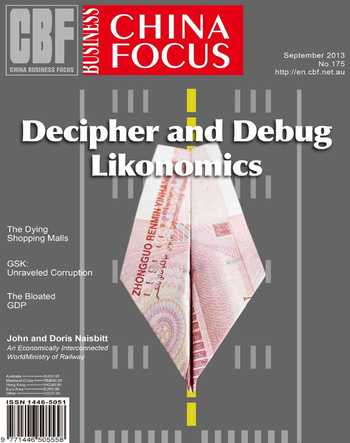Kraft’s New Name,Fortune or Bane?

Whats Mondelēz? When asked that question, most Chinese people might feel confused by that name. But if you ask them what Kraft is, they will nod at their recognition.
Undoubtedly, they will be surprised to find that Mondelēz is actually Kraft, and they will get to know the name more and more frequently in the future while the name Kraft might be no longer heard.
Thats because Krafts branch in China is going to change its name to Mondelēz China. In Chinese it is called “Yi Zi” (literally meaning the memory of flavors). The new name took effect on July 7, and the name“Kraft” has been put into the museum.
Actually, the change of name in China is several months later than its headquarters. In October 2012, Kraft spun off its global snacking and food brands to form Mondelēz International, a new life for the biggest snack and biscuit maker in the world. And the name Kraft was only used for its grocery business that is open to North America.
Not an Easy Task
The change of name in China was revealed in May 2013, as Krafts official email have a new line at the end saying that “Kraft China is going to change the name of the company in 2013 to Mondelēz China and we will use the email address ending with mdlz from now on”.
Two months later, Kraft announced the completion of the name change and appeared in front of the public as Mondelēz China. Its business and brands portfolio do not change with the name. It is still focused on biscuits, candies, gums, coffee and instant beverages.
The announcement of name change is easy, but the process is much more complicated. Mondelēz China gave out a detailed description how the Chinese name Yi Zi is gained.
According to the announcement, this name is a result of the collective wisdom of the employees. Two weeks before the name change, Mondolēz International (then known as Kraft) began to collect ideas from global employees. About 1,700 names were gained. The global team then narrowed down the list before giving tit to the management team for the final decision.
The management team immediately began to think of which one is better. Meanwhile, a special team was assigned with the task of checking the ownership of the name to see whether it has been registered in the world.
In order to get the best and most suited idea, Kraft invited the Focus Groups, which actually consist of representatives of consumers, to offer their advices in 28 languages.
As a senior executive revealed, the advices in 28 languages are to clear off any predicaments caused by the similar pronunciation and possible misunderstandings in different markets.
After a thorough and careful study, they finally chose Mondelēz in May 2012. In French, Monde means World while Delēz means Delicious. So you can interpret the name into“World Delicacy”.
Things are not easier when it came to changing the name in China. In 2012, the emerging markets contributed to 40% of the total income for Mondelēz. And, as its CEO Irene Rosenfeld said, China is the “most important market among all emerging markets”. So, in order to make its new name stay in favor of Chinese consumers, Mondelēz firmly followed two standards: it needs to match the companys brand image and has a good connotation. They translated Mondelēz into different Chinese phrases with good meanings based on its syllable.
However, thanks to the rich contents of Chinese, Mondelēz has to find the best Chinese name from ten thousand candidates. According to its email, the name “Yi Zi” was chosen after three rounds of design, three rounds of cultural and linguistic inspection, three rounds of legal check,and one round of executives votes.
When both the international name and the Chinese name are fixed, Mondelēz has to face the problem of the new logo, which is as important as the name. An insider from Mondelēz said that the headquarters of Mondelēz expected the new Chinese logo to carry on the joyful feature of the English logo while carrying out the feature of being steady. It seems to be a pair of contracted concepts. How to combine them together without damaging the harmony is a tough task for the logo designers.
The Huge Spending
It is a rare case that a Fortune 500 completely gave up its previous name that was widely known and accepted. From the brand marketing, changing the name usually costs a lot of money to promote the new name.
“Kraft wants to distinguish the remaining Kraft, which is the grocery business from Mondelēz, which represents original Krafts main business,” said Li Zhiqi, a marketing expert in China. According to him, Kraft was translated into Ka Fu in Chinese. These words have no real connotations and are hard to make people relate it with delicious cookies and snacks. These things need a conceptual value, which means that“Yi Zi” is more suitable for a snack brand.
To get the better name known to consumers cannot be neglected. According to Li Zhiqi, a well-established enterprise needs to spend US$300 million in changing its name, starting from survey to designing and then to fixing the plan of promotion. In addition to the following promotion cost, the total spending might amount to US$3 billion.
Prior to Kraft, Coca Cola and Lenovo also change their names or logo. However, their change took place gradually instead of the sudden change like Kraft. Lets imagine what a consumer will think when he/she found the familiar “Kraft” gone from the package of his/her beloved Oreo and was replaced by “Mondelēz” or “Yi Zi”.
How to deliver the implication of the new name to the consumers is a long and tough campaign.
That requires Mondelēz to spend a lot of money in making the name“Mondelēz” or “Yi Zi” known to more people. Liang Mingxuan, a researcher of food industry at China Investment Consultancy, said that Kraft has a good reason and intention to change its name, but it has to assume the risk that the new name will not be recognized by the market and consumers. In China, Mondelēz has to face the duo stress of increasing competition and the slower economic growth. In his opinion, the transition between old name and new name requires Mondelēz to spend a lot of time and money on this matter.
But if the influence could be handled well, Mondelēz will take back the investment soon, Li Zhiqi said.

